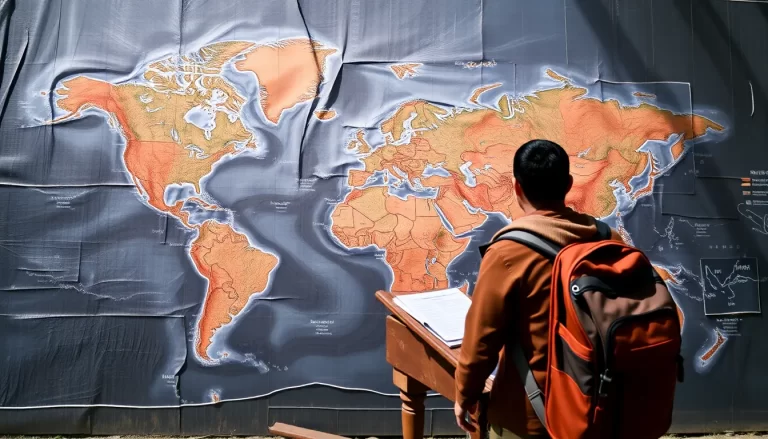As the world grapples with the unprecedented impact of the COVID-19 pandemic, one of the most affected sectors is undeniably travel. The changes we are witnessing are not merely temporary; they are likely to reshape the entire travel landscape for years to come. Understanding these changes can help travelers and industry professionals alike navigate the new realities of travel in a post-pandemic world.
The immediate impact of COVID-19 on travel
The travel industry operates on the fundamental principle of people moving from one place to another. However, when countries instituted lockdowns and travel bans to curb the spread of COVID-19, the industry was brought to a standstill almost overnight. The consequences are staggering.
As of now, the travel sector accounts for about 10% of global employment. This means that millions of jobs are at risk due to the drastic decline in travel. To put this into perspective:
- Airlines have grounded their fleets, resulting in an astronomical loss of revenue.
- Hotels and accommodations are facing unprecedented cancellations, leading to massive layoffs.
- Tourism-dependent economies are experiencing severe economic downturns.
This situation is far worse than a typical recession, where some level of travel continues. With the current global restrictions, we are witnessing a total halt.
The long-term effects on the travel industry
Experts predict that the travel industry will shrink significantly in the coming years. The World Travel and Tourism Council (WTTC) estimates that up to 75 million jobs could be lost globally, with a potential rate of 1 million jobs lost daily. This loss will not only affect airline staff but also those working in hotels, restaurants, and travel agencies.
Furthermore, many small businesses in the travel sector, including hostels and local tour operators, may not survive this crisis. Most of these businesses operate with minimal cash reserves, which means that they are unable to withstand prolonged periods without income.
Travel behavior changes post-COVID
As restrictions begin to lift, a significant behavioral shift is expected among travelers. Initially, people will likely prioritize local and regional travel over international trips. Several factors will drive this change:
- Cost considerations: With many facing economic uncertainty, budget-friendly travel will become a priority.
- Safety concerns: Travelers will be wary of potential outbreaks when considering destinations.
- Preference for familiar surroundings: Individuals might feel more comfortable exploring nearby areas rather than venturing far from home.
Travelers will also be more cautious about engaging in crowded spaces, leading to a potential decline in activities that involve large groups.
How airlines and accommodations are adapting
In response to the pandemic, airlines and hotels are implementing new safety protocols to restore traveler confidence. Some of these measures include:
- Enhanced cleaning procedures: Increased frequency and thoroughness of cleaning in public areas and guest rooms.
- Social distancing measures: Limiting capacity on flights and in hotels to ensure adequate spacing.
- Flexible booking policies: Offering more lenient cancellation and rescheduling options to accommodate uncertain travel plans.
These changes are crucial for winning back the trust of consumers wary of traveling during a pandemic.
Future of the cruise industry
The cruise industry, notorious for its close quarters, faces particular challenges. The health risks associated with cruising have been highlighted during this pandemic, leading to a dramatic shift in perception. Experts suggest that:
- Many potential travelers might avoid cruises altogether, fearing outbreaks.
- New health guidelines will likely restrict the number of passengers on board.
- Increased scrutiny and health screenings will become standard before departure.
The long-term viability of the cruise industry will depend on how well it can adapt to these new realities and reassure customers of their safety.
Potential for sustainable tourism
Amid the chaos, there is a glimmer of hope that the pandemic could lead to a more sustainable approach to tourism. With overcrowding and overtourism becoming critical issues in many destinations, the current crisis presents an opportunity for a re-evaluation of tourism practices.
Countries may focus on implementing measures that promote:
- Environmental sustainability: Reducing carbon footprints through eco-friendly travel options.
- Community-based tourism: Encouraging travelers to engage with local cultures and economies.
- Responsible travel: Advocating for fewer but more meaningful travel experiences.
This shift could lead to a more balanced distribution of tourist traffic, benefiting both travelers and host communities.
Preparing for future travels
As we look toward a future where travel resumes, it’s essential for travelers to stay informed and prepared. Here are some logistical tips for planning your next trip:
- Book flights wisely: Use comprehensive search engines like Skyscanner to find the best deals.
- Choose accommodations carefully: Opt for platforms that prioritize hygiene and flexible cancellation policies.
- Invest in travel insurance: Policies that cover pandemic-related issues may become essential.
Traveling will likely require more planning and flexibility than before, but with careful preparation, you can navigate the new landscape successfully.
Conclusion: Embracing change in travel
The travel industry is undoubtedly facing one of its most significant challenges. However, with every challenge comes the potential for renewal and growth. By embracing changes in behavior, adapting to new safety protocols, and prioritizing sustainability, the future of travel can emerge not only intact but even stronger.







